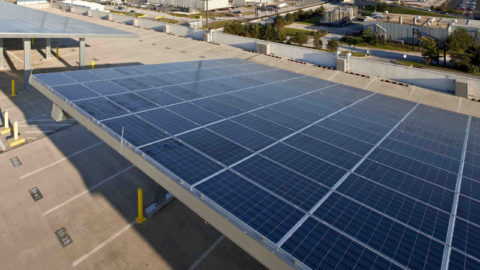- To & From BWI
- At BWI
- Flying With Us
Environmental Sustainability
 BWI Thurgood Marshall Airport is serious about being green.
BWI Thurgood Marshall Airport is serious about being green.
As a community partner, we care about the protection of the natural environment.
BWI Thurgood Marshall Airport understands the importance of protecting and preserving our air, water, and natural resources while providing exemplary service to passengers, employees, and the surrounding community.
Climate
 48.6% of BWI Thurgood Marshall Airport’s energy portfolio comes from carbon-free sources including a 500 kW solar panel array on our Daily Garage.
48.6% of BWI Thurgood Marshall Airport’s energy portfolio comes from carbon-free sources including a 500 kW solar panel array on our Daily Garage.
The availability of multiple public transportation options (Amtrak, MARC Train, MTA Light Rail, Bus) allows for easy connections from BWI Marshall to Baltimore, Washington, D.C. and destinations along the East Coast.
27 Electric Vehicle charger are installed at airport facilities: 15 fast chargers, 12 Level 2 chargers. Since installation, the EV chargers have offset over 800 tons of CO2.
Circularity
 Over 100 tons of food scraps are collected annually from restaurants at BWI Marshall to be made into compost.
Over 100 tons of food scraps are collected annually from restaurants at BWI Marshall to be made into compost.
More than 50 tons of cooking oil are collected each year from airport restaurants to be refined into sustainable aviation fuel.
Nearly two dozen water filling stations are available throughout BWI Marshall, following the installation of additional water filling stations during our recent restroom renovation project. This effort helps reduce single-use plastic bottles.
Chesapeake Bay
 The installation of efficient fixtures in our new restrooms yield a 20% water savings per average passenger.
The installation of efficient fixtures in our new restrooms yield a 20% water savings per average passenger.
72,000 oyster shells a year are collected each year from airport restaurants to regrow reefs in the Chesapeake Bay.
The BWI Marshall campus is home to a 122 Acre Forest Conservation Easement including 84 acres of Nontidal Wetlands of Special State Concern. The easement provides a nature buffer, carbon sequestration, soil stability, and flood control.